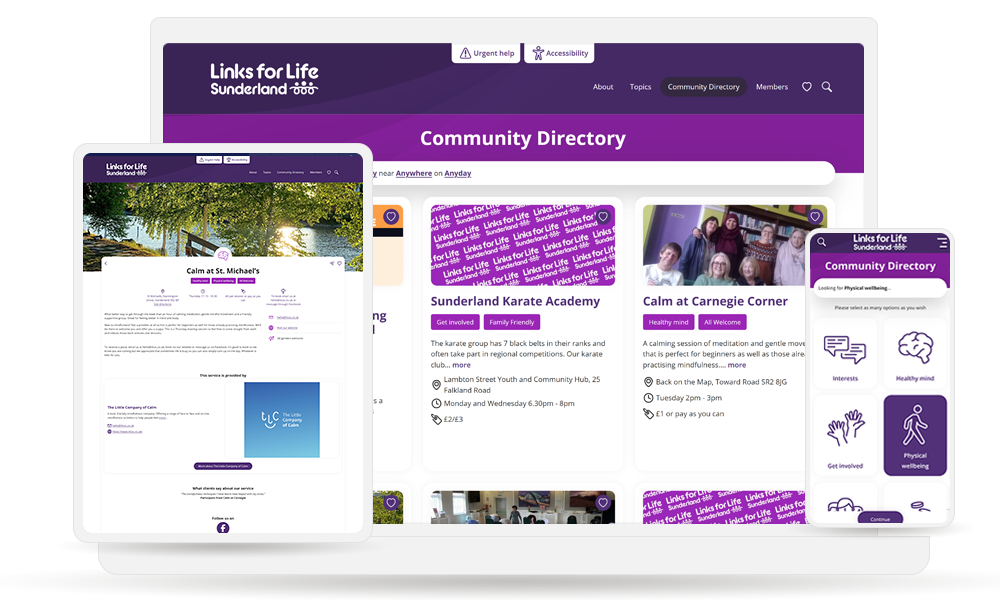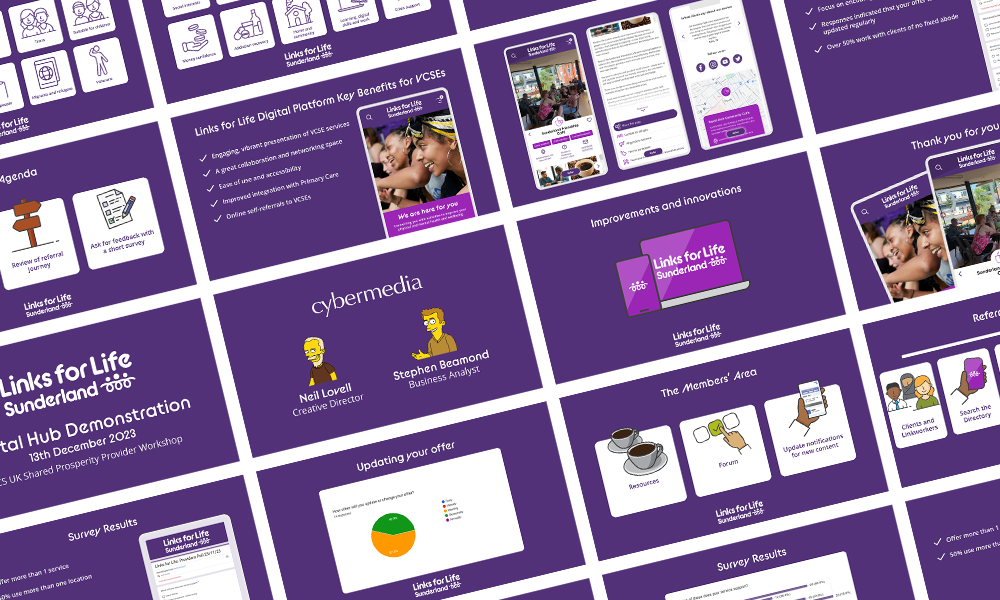Links for Life Sunderland Social Prescribing Platform
Links for Life is a partnership of Sunderland City Council, NHS North East and North Cumbria Integrated Care Board and numerous community sector organisations in the region.
Links for Life is a partnership of Sunderland City Council, NHS North East and North Cumbria Integrated Care Board and numerous community sector organisations in the region.

The aim of the Links for Life’s initiative is to bring people together within communities and help them to lead healthy, happy lives, with no one left behind.
To help coordinate and referrals, the partnership needed a Social Prescribing service directory with an integrated referrals system and we were delighted to win the tender for this important project.

Engagement with the Links for Life Partnership’s diverse range of voluntary, community and social enterprise (VCSE) organisations was central to the project and we worked in close collaboration with the Links for Life project team to plan and deliver engagement activities.
These activities included consultation on the service’ directory’s look and feel, planning of inter-organisational collaboration spaces, as well as directory profile and referral features. As part of the consultation process we planned and delivered surveys and presentations to the partner network and hosted User Acceptance Testing activities prior to the platform’s launch.
The activities were critical to helping us tailor the platform to the needs of VCSE organisations and helping to ensure ‘buy-in’ of the partner network.
Sunderland City Council had previously commissioned an agency to research and create a brand for the Links for Life programme and we were provided with access to these materials from which to work up a complete design concept.
We are experts at creating engaging websites for health and wellbeing initiatives and we used our expertise to create a design that is inspiring, positive and intuitive.
The Homepage header area features embedded video footage showcasing the inclusive and diverse nature of the Links for Life offer, and communicating that there is something for all ages, interests and abilities.
The commitment to inclusivity is integral to the design and all templates are compliant with WCAG 2.2 ‘AA’ accessibility standards to ensure compatibility with screenreaders and ease of use for visually impaired citizens.
We provided the Links for Life team with flexible templates to publish a broad range of information on various health and wellbeing topics from healthy bodies and mental health, through to money and feeling safe at home. A ‘like’ and quick share facility within the templates enables citizens to easily save things to read later and to share resources with friends and family via social media or email.

A critical aspect of the project was providing Links for Life partners with an easy-to-use profile builder to showcase their diverse range of offers.
The profile builder readily accommodates single service, multiple service and multiple services delivered at multiple locations offers and is optimised so partners never need to duplicate information.
Partners can easily tag their offer by audience (e.g. ‘older people’, ‘carers’, ‘inclusive’), set days and times for their services, pin locations to a map and add service descriptions. Partners can also add imagery and photo galleries, if available.
An innovative feature of our social prescribing service directory is it automatically prompts partners periodically to check their profiles and associated offers are up to date. This is of key importance to ensure citizens are presented with a trusted source of accurate information going forward.

The Links for Life team is committed to supporting its partner network of VCSE providers and we were commissioned as part of the project to implement a collaborative portal for partner providers.
Partners can use the same set of credentials they use for maintaining their service directory profiles to access collaborative spaces where they can ask and answer questions, take part in discussion topics and access key resources and documents.
The collaborative space is also a valuable tool for the Links for Life team to circulate important information such as agreements and to keep partners informed with the latest news and developments within the network.

The Links for Life service directory is designed to be easy to use and inclusive, including for citizens with English as a second language and individuals with developing digital skills.
An innovative feature of the Links for Life directory of services is a conversational filter that makes it quick and easy for citizens to find things tailored to their needs, assisted with clear iconography. The approach means citizens are never presented with overwhelming or confusing filters.
The Links for Life service directory has highly engaging presentation of partner records, complete with imagery. The directory is also location-aware and has a map view to help citizens readily understand what’s in their locality.
Local GPs and other healthcare professionals can use the Links for Life service directory with patients to identify suitable activities to support their health and wellbeing.
The service directory also supports direct citizen self-referral to partner providers. Partners can choose how they wish to receive referrals, including secure referral via the Links for Life platform.
For partner providers with this option selected, citizens see a ‘send a referral’ button on the service profile page in the service directory and can use the button to complete an online self-referral form.
Partners receive these types of referrals in an inbound referral dashboard within the Links for Life Theseus: Social Prescribing platform. The interface is responsive making it easy to use on tablet and mobile devices as well as laptops. For referrals received, partners can also report citizen outcomes back to the Links for Life team.

The Links for Life team can track which services are most popular in terms of views within the service directory and which themes were interacted with most, e.g. ‘healthy eating’, ‘befriending’ or ‘physical activity’.
The number of referrals received by each partner provider and the outcomes related to these referrals can be tracked within Theseus: Social Prescribing data dashboards, available to the Links for Life team.
The dashboards provide the Links for Life team with insight into various service aspects such as the waiting time from point of referral to acceptance, the number of referrals received by each partner and the percentage of successful outcomes recorded. The Links for Life team are also able to drill into details to understand client-level data for aggregated data.
We really enjoyed working with the Links for Life team and its enthusiastic and positive partner network. The Links for Life initiative now has a vibrant and engaging shop window into its offer with an integrated ‘best in class’ service directory that is both attractive and highly accessible.
The data dashboard and reporting facilities within Theseus: Social Prescribing also provide the Links for Life team with excellent insight to inform service planning for the initiative going forward.